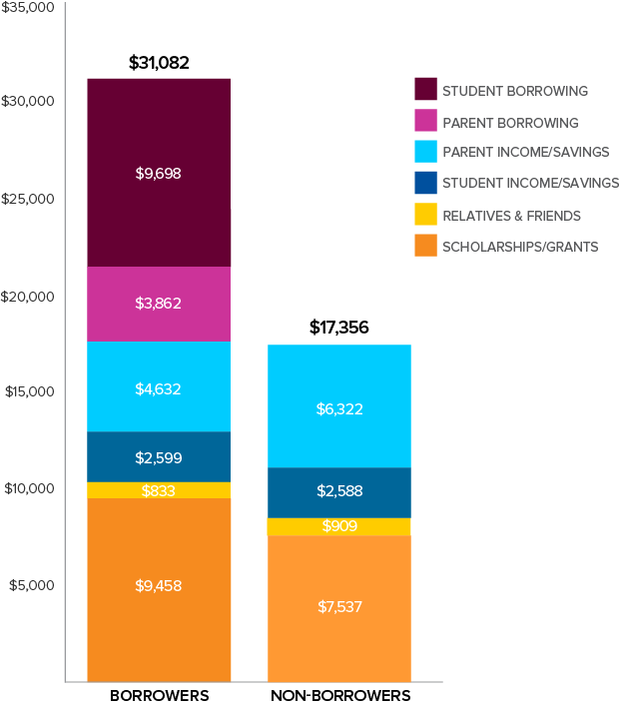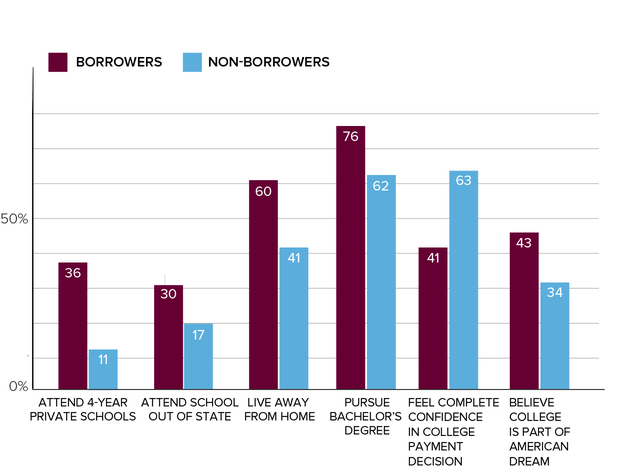College shoppers are getting smarter about costs
There's death, there's taxes and then there's college tuition. The price of a four-year degree has marched steadily upward for decades, only recently slowing down to match the rate of inflation.
Not everyone's buying it, however: Students and their families are becoming more cost-conscious when they choose a school. A recent report from Sallie Mae, "How America Pays for College," demonstrates just how much has changed in the 10 years the group has been tracking college financing.
Today, 86 percent of families fill out an application for financial aid, up from less than three-quarters 10 years ago. A large majority of families and students aren't even considering colleges because they're too expensive. This year, 69 percent of respondents eliminated schools from their college search based on price, up from 58 percent who did so in 2008.
And the portion of respondents saying there's no relationship between the cost of a college or university and its quality grew slightly, from 40 to 45 percent.
For Julia Clark, senior vice president at Ipsos, Sallie Mae's partner on the report, these are "soft signs" that people are starting to take the cost of college more seriously.
"More and more striking is that we see that steady increase in people eliminating schools from their consideration because they're too expensive for that family to consider," she said.
"Nearly every family we talked to reported some step toward making a college more affordable," such as students choosing to live at home or to work while in school. "That speaks to cost-consciousness and value-consciousness as well," said Richard Castellano, a spokesperson for Sallie Mae.
A few reasons are behind the cost-consciousness. Certainly the looming mountain of student debt, which has been blamed for everything from the sluggish pace of the economic recovery to millennials who refuse to move out of their parents' basement, plays a role. Another factor is that students are putting more of their own money on the line. Unlike in previous years, students are now contributing a full third to the costs of college -- as much as parents.
"The conventional wisdom was parents [were] really guiding that process and taking out their checkbook," said Castellano. "This year we're seeing students taking more responsibility."
Finally, the realization is growing that college may not be the last stop.
"These days, there are many jobs that would like a master's degree -- it's not just an undergrad degree that's expected or required," Clark said. "The actual value [of a degree] is being much more closely scrutinized by parents, and some data suggests that they're making smarter choices."
Still, plenty of households have borrowed to pay for college. Strikingly, Sallie Mae found that people who took out debt for a degree didn't spend less money out of pocket than those who didn't. Borrowers and nonborrowers actually spent almost identical amounts of nondebt money on college, including grants and scholarships, savings, income and money from friends and family.
Average college spending of those who borrow for college and those who don't
The families who borrowed, however, used that money for a higher-cost education, spending about 80 percent more on college than those who don't borrow. In addition, the report found, "Borrowing families were more likely to choose more expensive options, such as private colleges, attending out-of-state schools and living away from home. Their school choice is driven more by academic program and prestige of the university than by cost. These families were more likely to aspire to fulfilling the American dream in their decision to attend college."
On the flip side, respondents who didn't borrow for college were more likely to say they were completely confident in the choices they made in paying for college.
Characteristics of those who borrow for college and those who don't
Who are these students who are getting into debt? They're more likely to be the second or third generation in their family to attend college and more likely to see attending college as the norm.
A significant regional component is also involved: The Northeast leads the way in borrowing for college as well as in overall college spending. Northeast families borrowed an average of $12,700 last year to pay for college, more than twice as much as families in the Midwest and four times as much as the average family in the West, who borrowed just $3,600.
Clark puts down the differences in debt to differences in motivation and values. "If attending college is a core value of you and your family, the idea of student loan debt is perfectly acceptable," she said. "It's seen as a 'good value debt,' like a mortgage."
And the college application process makes getting into debt easy. Families who manage to avoid it often make deliberate choices to do so, such as working or saving more, or choosing lower-cost institutions.
"I had a full-tuition scholarship and a job when I went to college, but because they said 'you can take student loans,' I did it," said Miranda Marquit, a financial expert at Student Loan Hero. "As an 18-year-old or 19-year-old, you're not sitting there thinking of it as money you have to repay."
Marquit recommends approaching the college choice as a business decision and choosing a school whose "risk" -- i.e., cost -- is commensurate with what you're likely to make in your career.
And consider scholarships and grants, which make up the last one-third of college costs in Sallie Mae's report. While college tuition is nominally rising, a record amount of students are receiving scholarships or grants, a higher-education industry group found this spring. These so-called tuition discounts are now reaching nearly half of all students. And at small private colleges, fewer than 10 percent of students pay full price, The New York Times found.






